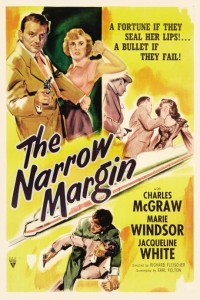“You’re just a job to me — a C.O.D. to be delivered to the L.A. grand jury.”
|

Synopsis:
A detective (Charles McGraw) escorting a gangster’s widow (Marie Windsor) on a cross-country train tries to protect her from ruthless assassins.
|
|
Genres, Themes, Actors, and Directors:
- Detectives and Private Eyes
- Hit Men
- Marie Windsor Films
- Mistaken or Hidden Identities
- Richard Fleischer Films
- Widows and Widowers
Review:
Richard Fleischer’s Oscar-nominated The Narrow Margin is widely regarded as one of the best B-noirs ever made. At just 71 minutes, the story moves quickly, making effective use of claustrophobic locales (most of the action takes place on a rattling train), mistaken identities (hardly anyone is who he/she seems to be), and hardboiled characterizations (McGraw and Windsor are both perfectly cast). While there are some minor plot discrepancies — which can’t be discussed without revealing spoilers — they’re easily excused, given that they don’t detract from the overall urgency of the narrative. I watched The Narrow Margin years ago, but had (conveniently) forgotten the central plot twist, and found it just as enjoyable the second time around. Highly recommended.
Redeeming Qualities and Moments:
Must See?
Yes. This well-received B-thriller is an all-around good show.
Categories
- Good Show
- Oscar Winner or Nominee
Links:
|
5 thoughts on “Narrow Margin, The (1952)”
A must – and, yes, “highly recommended”.
It’s a terrific, economic train ride – and more of a suspense film than classic noir, though it masquerades as one effectively. For my money, I’d prefer some juicier tough-talk but what’s on display suffices, even if it’s not particularly quotable. (I do wish Windsor had been given some more bite in her lines, but that’s me – and maybe Windsor as well.)
A number of clever touches along the very-tense way.
This is another example of ‘the less said about it the better’. (There is one moment that seems a slip-up, but it hardly matters and can easily be overlooked.)
A very satisfying experience for ffs.
I’m not quite sure what you mean by wishing Windsor had been “given some more bite in her lines”, and then stating “[but that’s] Windsor” — can you clarify?
From the first moment we see Windsor, she’s recognizable as a ‘type’ in films of this sort: ‘a real broad’. So, even though her character is given sassy things to say, I just wish they were more so; lines with a bit more sting, and perhaps a touch of wit, to them. The film is not at all hurt for lack of them – but what actor doesn’t love having real zingers to say? (That’s why I threw in that perhaps, as an actor, Windsor may have shared my thought.)
I’ll have to rewatch at some point to see if I agree with you or not on this point. The fact that I noted “plenty of zingy dialogue” as one of the film’s redeeming features leads me to believe that I wasn’t particularly dissatisfied… While a lot of the dialogue is typically hard-boiled, I think it suits the genre.
I think we’re rather in agreement re: the dialogue…just that I would have preferred a tad more ‘oomph’. I wouldn’t say I was dissatisfied.